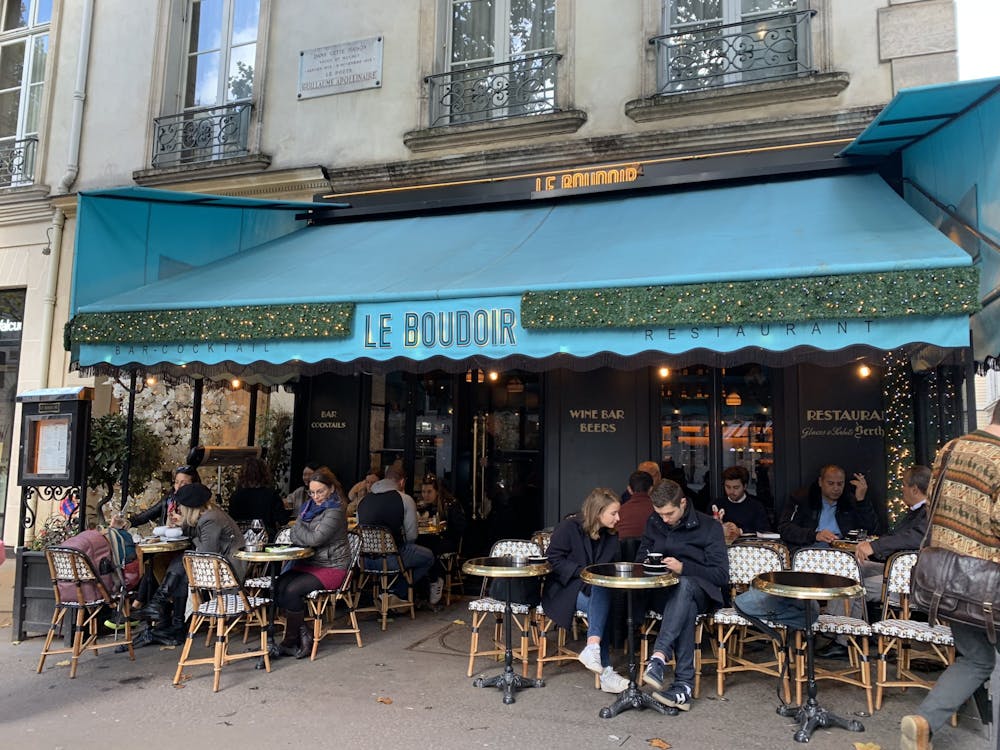
I’ve always wanted to study abroad in Paris. In high school, I chose French even though I was living in Los Angeles and should have chosen Spanish. I always held on to the idea that one day I would be walking along the Seine, eating a croissant, holding hands with a real live French man.
Now, I am living out my fantasy, sans French man. I take a lot of long walks here, trying to soak up as much of the city as possible before I inevitably have to return to my Hopkins to do list. But for now, I live in my own little bubble where the air is heavy with the smell of fresh bread and cigarette smoke and I contemplate what life would be like if I never left.
There’s only one problem. I absolutely cannot speak French.
Granted, I have only studied college-level French for one year. And French is hard. But there is nothing as embarrassing as standing in line to buy a metro pass and blanking on what the phrase for “please” is.
It’s not like I’m not trying. I participate avidly in my French class, listen to Duolingo podcasts and even have pretend French conversations inside my head. Still, I get solidly mediocre marks in class, can never seem to get my pronunciation right and freeze up the moment a stranger talks to me.
Sometimes I’m pretty sure that the Parisians misunderstand what I am saying on purpose — or at least that’s what I tell myself. Take the other day for instance. I decided to write this column in true French fashion at a café where I hoped I could gain some sort of inspiration.
I walked into the shop and successfully ordered an Americano. The barista then asked, “Quel est ton nom?” I told him my name, but he looked at me blankly.
“No no,” he said, making me question my French 101 skills. Did I actually mess up this interaction?
He then proceeded to point at himself in an overly grandiose gesture.
“I am Pierre,” he said loudly, mouthing the words as if I were unable to hear and had to lip read what he was saying.
“I am Pierre,” he repeated just as loudly (just in case I didn’t get what he was saying the first time). “What do they call you?”
I paused, blushing because the people next to me were closely observing. I, in fact, did not misunderstand what he was saying. But somehow, we were still misunderstanding each other.
I later recounted this story to an Italian friend. He laughed and told me people would always assume I was an inept American if I ordered an Americano. I argued that people purposefully pretend to not understand me. He suggested that I learn enough French so that I can explain this theory to the next barista who “pretends” to not understand me.
He proceeded to tell me a joke. What do you call someone who speaks three languages? Trilingual. What do you call someone who speaks two languages? Bilingual. What do you call someone who speaks one language? American.
I laughed, because it’s easy for me to laugh at myself and my country, but I wish I didn’t have to. At times like these I wish that I were able to be separated from American stereotypes and the English language entirely.
But it’s hard to break away from the so easily applied label of “American.” Aside from my cringey conversations in French, my conversations in English host a whole other level of shame. If I had a euro for every time someone asked me if I liked Trump I wouldn’t have to learn French because I could just hire a personal translator.
I’ve also been asked about Walmart, why we use feet instead of meters, if people really eat fast food for breakfast and why we watch Fox News. These are all oversimplifications of American culture, I know.
But they still make me analyze the way our country presents itself to the rest of the world.
I desperately want to get out of my Americanized bubble. Doing this is a fundamental concept to study abroad.
In this massive bubble, language is really the most basic of differences between French and American culture. But it’s the gateway and a necessary element to learning French tendencies, properly learning French history and fully participating in Parisian life.
Hopefully, every tragic train wreck of a conversation I have now will add to my motivation to become fluent. Unless I give up caffeine, I’m going to have many more awkward coffee shop experiences.
It’s also probably unavoidable that I’m not going to do phenomenally in my French class.
But I’ll stick to my Duolingo and continue to nervously order coffee, embracing (with true unabashed American pride) my personal humiliation. C’est la vie.

















